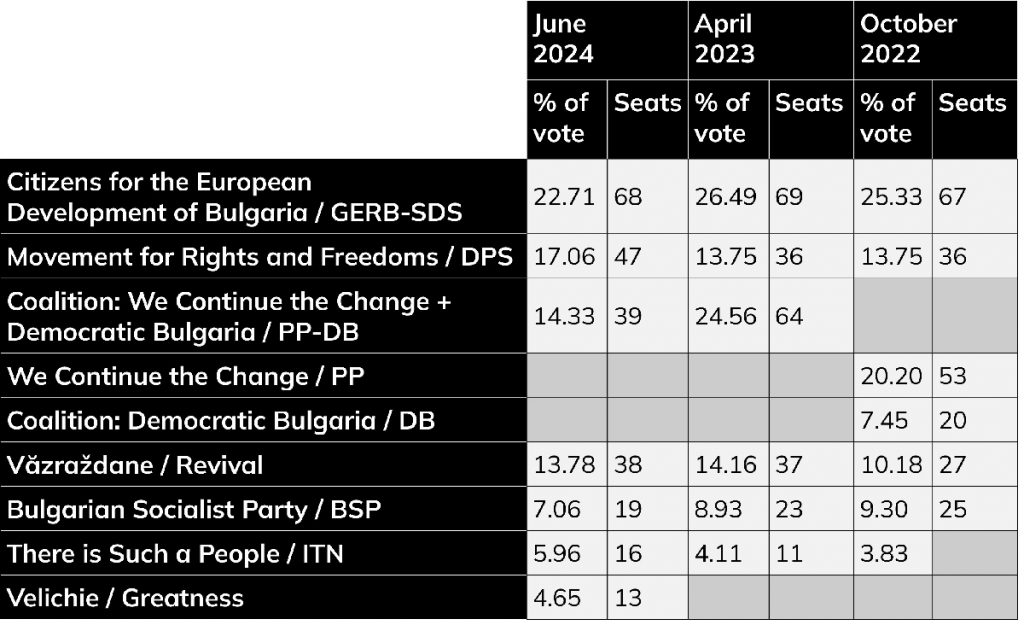Bulgarians recently went to the polls for the sixth time in three years to try and resolve an ongoing political crisis, writes Dragomir Stoyanov. The results suggest a return to government made up of status quo parties and a likely end to any prospects of political reform
On 9 June 2024, Bulgaria held yet another national parliamentary election. The election overshadowed the elections for the European Parliament held on the same day.
Bulgaria's constant return to the ballot box is the result of an ongoing political-electoral crisis dating back to 2020. During the summer of 2020, a wave of protests took place against the coalition government of GERB and the United Patriots, and against the abuse of office by the Chief Prosecutor Ivan Geshev. Protesters demanded progress towards re-establishing the rule of the law and battling endemic corruption.
In summer 2020, protesters demanded progress towards re-establishing the rule of the law and battling endemic corruption
The protests failed to bring down the government of Boyko Borissov. Instead, they revitalised the reform parties: Da Bulgaria, DSB (Democrats for Strong Bulgaria), the populist anti-establishment party There Is Such a People (ITN), and the far-right Revival.
Although the protestors did not achieve their main political aim – getting the GERB government to resign – they succeeded in making clear that judicial reform and the fight against corruption were the top priorities for a significant part of Bulgarian society.
Da Bulgaria and DSB (united in a coalition as 'Democratic Bulgaria') tried to begin a radical reform of the judicial system but their attempts to fight corruption were met with fierce resistance by GERB and DPS. After a series of snap elections and the inability of either political camp to form a stable government, the reform parties came together in a coalition in 2023. We Continue the Change (PP) and Democratic Bulgaria (DB) went on to form a controversial coalition government with GERB. This turned out to be very unpopular among reformist voters. The reform parties lost the political initiative.

We can summarise the outcome of this latest election (see table) in four key points:
Firstly, there was a record low turnout of 34.4%. In general, Bulgarian citizens are not very enthusiastic about participating in elections. In fact, this turnout proved to be the lowest in the entire post-communist period.
Obviously, this is partly a reflection of electoral fatigue among voters. But it also shows that a very large number of voters feel unrepresented by the political institutions they elect. This constitutes a significant risk for the future of liberal democracy in Bulgaria.
This election stands out for the victory of GERB and the surprising second place achieved by DPS. These results suggest that the status quo parties are back and have the political initiative once again.
Reforms in key sectors such as the judiciary, the fight against corruption, healthcare, and education are unlikely to follow the status quo parties' success
Despite ongoing corruption scandals – the leader of DPS and another high-ranking official from GERB are sanctioned under the Magnitsky Act – voters continue to support these parties. Although the low turnout also contributed to this result. GERB’s electoral campaign emphasised stability and security. This suggests that reforms in key sectors such as the judiciary, the fight against corruption, healthcare, and education are unlikely to follow.
The coalition of reform parties, PP-DB, suffered a significant loss of votes. This was almost certainly the result of its unpopular decision to form a coalition government with its rivals GERB.
Coalition leaders failed to explain their decision to surprised voters, which led to uncertainty about the Coalition's commitment to reform.
And so, after nine months in power, and following strong criticism from its coalition partner GERB, the government dominated by PP-DB resigned. With 39 seats in the new Parliament, PP-DB is not in a favourable position. PP-DB has no real tools to advance its reformist political agenda.
There were also some interesting electoral outcomes among the smaller political parties.
The Bulgarian Socialist Party (BSP), formerly Bulgarian Communist Party (BKP), has been a central player in the post-communist period. The party is now dealing with an existential crisis after it received its lowest share of the vote (7.06%) since 1989.
The Bulgarian Socialist Party is now in an existential crisis after it received its lowest share of the vote (7.06%) since 1989
There Is Such a People, the populist party led by the showman Slavi Trifonov, secured parliamentary representation (again), with 5.96% of the vote.
On the far right, Revival won a 13.78% share of the vote and has secured representation in parliament.
Finally, a new party, Greatness, managed to mobilise support based on nationalistic, pro-Russian, Eurosceptic rhetoric. Greatness gained 4.65% of the vote and just passed the electoral threshold of 4% for representation in parliament.
Most likely, the outcome of this latest election will be a coalition government between GERB, DPS and ITN. Borissov is a long-time leader of GERB and has served as Prime Minister of Bulgaria over three terms. He is also dogged by corruption scandals and is not, therefore, expected to lead the new government. Yet, putting forward another strong political figure could also be risky in the current volatile political environment. The new cabinet will likely be an expert government that is supported by the three parties and promotes their policies.
The likeliest outcome of this latest election will be a coalition government between GERB, DPS and ITN
What this will mean for Bulgarian politics will depend on the policies the new government pursues in practice. There is a risk that the new government will seek to re-establish the GERB model of governance. Many Bulgarians associate this model with corruption, nepotism, clientelism and the suppression of free media. In this scenario, Bulgarian citizens can expect a new wave of protests and further snap elections.